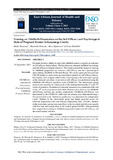Training on Childbirth Preparation on the Self-Efficacy and Psychological State of Pregnant Women in Kakamega County
Date
2023-09-01Author
Wanyonyi, Mable
Wanzala, Maximilla
Kipmerewo, Mary
Raballah, Evans
Metadata
Show full item recordAbstract
Pregnant women’s ability to cope with childbirth pain is a significant indicator of self-efficacy during labour. The link between antenatal childbirth knowledge and self-efficacy is largely unknown. This study assessed the impact of training in childbirth preparation on women’s self-efficacy and their psychological status during childbirth in Western Kenya. We used a quasi-pre-test post-test CBS EI design to assess training intervention pinned on self-efficacy theory. Participants were assigned either to the control group or the intervention group at the antenatal care clinic. A pre-test on self-efficacy was performed using the childbirth self-efficacy inventory scale (CBSEI-16). The intervention group received two sessions of 2 hours each of the training between the 3rd–and 33rd weeks of gestation. Evaluation of outcome measures was conducted at the end of the 36th week of gestation and within 48 hours after delivery for childbirth self-efficacy and fear and anxiety, respectively. Childbirth self-efficacy was determined by the CBSEI-16, while fear and anxiety were determined using a five-point Likert scale. Statistical significance was determined by independent t-tests. Mothers in the intervention group had higher post-test scores for Outcome Expectancy (OE) and Efficacy Expectancy (EE), P<0.001. Mothers in the intervention group were more likely to be in control and felt more capable with less fear and anxiety than in the control group P<0.001. Data presented here suggest that training in childbirth preparation improved self-efficacy and decreased anxiety and fear
URI
https://doi.org/10.37284/eajhs.6.1.1407https://journals.eanso.org/index.php/eajhs/article/view/1407
http://ir-library.mmust.ac.ke:8080/xmlui/handle/123456789/2408
Collections
- Journal Articles [411]

